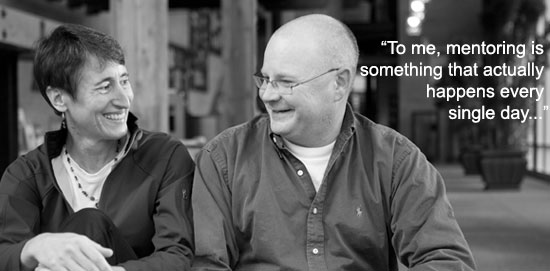Read an excerpt from Mentoring Moments

Mentor Sally Jewell, CEO of REI, and John Sheppard, Foster Evening MBA Program alumnus and Director of REI Adventures and Outdoor School share a laugh during a mentoring moment. Read an excerpt from author Susan Canfield’s interview with Jewell below.
The following excerpt is taken from an interview with Sally Jewell, CEO of REI. REI is a national outdoor retail co-op dedicated to inspiring, educating and outfitting its members and the community for a lifetime of outdoor adventure and stewardship. Founded in 1938 by a group of Pacific Northwest mountaineers seeking quality equipment, REI operates retail stores nationwide, two online stores, and an adventure travel company, REI Adventures. REI employs nearly 10,000 people and was ranked 12th in Fortune’s 100 Best Companies to Work For in 2009.
Susan Canfield: Let’s begin by talking about your definition of mentoring.
Sally Jewell: To me, mentoring is something that actually happens every single day, and it goes both ways. Even if the person I’m talking to is 15 years old, I very much believe relationships are two-way and you gain as much as you give.
As a parent, for example, you have opportunities to mentor your kids and their friends. I had been in banking for 19 years and had just gone to REI as an employee. While I knew a fair amount about business, I really didn’t know anything about retailing and fashion. I don’t consider myself in any way to be fashion-forward. So as I talked to young people, I was able to ask them about what they did in their spare time, what they think is cool.
Susan Canfield: You volunteered for the MBA Mentor Program a few years ago. Do you recall why you chose to participate?
Sally Jewell: I have always prioritized my time for students over other requests because the leverage is so much better. I remember as a student the impact of having a glimpse into the real world.
Susan Canfield: John Sheppard, a graduate of the evening MBA Program and director of REI Adventures and Outdoor School, considers you an inspiring role model. What do you value in him?
Sally Jewel: His ability to think strategically. What John did very capably in his first year or so, as manager of REI Adventures, was dig in and understand what the barriers are to people participating in outdoor recreation. What’s the purpose of REI Adventures? And how can we use REI Adventures to help people overcome the gaps they feel in terms of their skills or confidence? He presented to our management team a strategy that still sticks in my mind and which I quote from fairly often.
John is both a strategist and a pragmatist. He has a good financial head on his shoulders, and he recognizes that for a business line to be sustainable it also must be economical. REI Outdoor School, which John initiated, is a money-losing operation for us.
But, if you look at a bigger picture in terms of its influence on the ability of people to become life-long outdoor participants, then the economic picture changes. John is very good at saying, “We need to pace growth in this business not only from an economic standpoint, but also from a quality standpoint so that we’re delivering safe, well-executed outdoor schools.”
Susan Canfield: What lessons do you most want to pass on to young people today?
Sally Jewell: If there is one word, I guess it would be “respect.” It is respecting everyone you interact with, regardless of pedigree, education level, or background, because the chances are pretty good you’ve got a lot to learn from them.
The reality in business and in life is that people who have been around the block, even if they have never been to college or finished high school, have tremendous wisdom that we can all learn from. These are things especially important to tell MBAs and lawyers, people with degrees that sometimes give them an air of superiority.
I also tell young people to stand up for what they believe in and try to encourage them to align with an organization where they feel they can make a difference.
The other thing I would say is that it is important to give back. Working your tail off is very common in the early years in business, but don’t forget to broaden your horizons and give back as well, because it’s the breadth and depth of your perspectives that’s really going to shape your contributions and success long-term.
Interested in reading more? Order your copy of Mentoring Moments from the UW Bookstore now.
